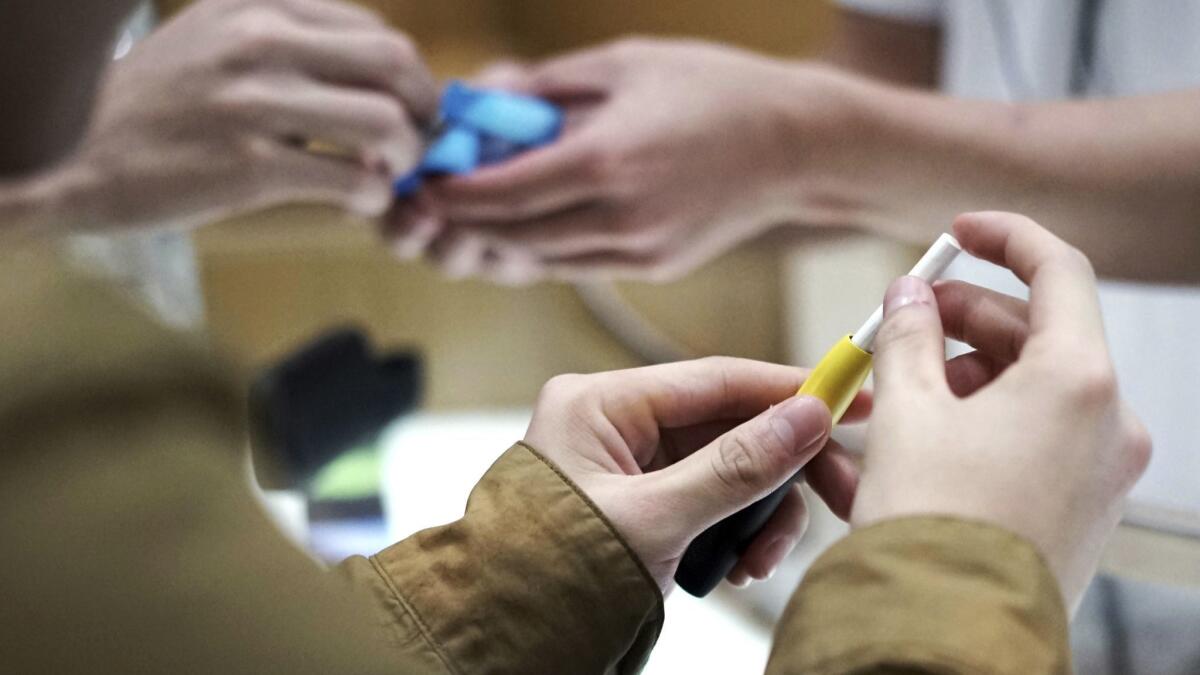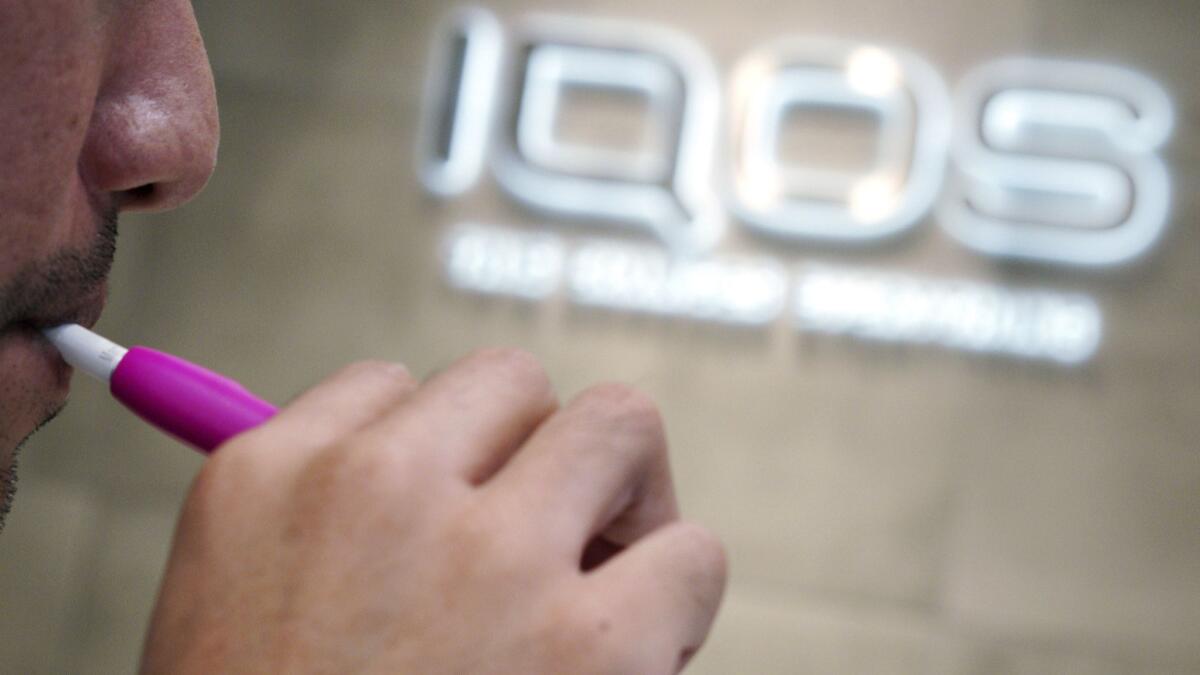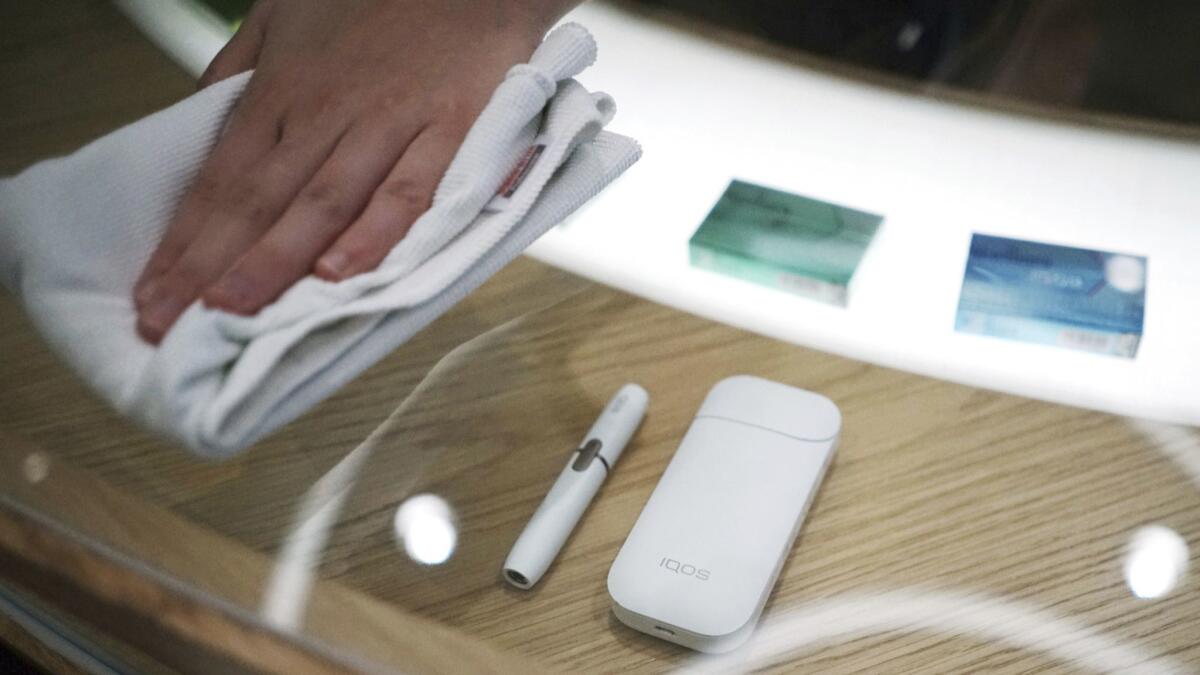Heated tobacco product touted as safer alternative to cigarettes is no less dangerous than smoking, studies find

In 30 countries around the world, consumers can slide a roll of dried tobacco into a sleek device, heat it to 350 degrees and inhale. The result is a hit of nicotine that feels like it’s coming from a traditional cigarette without producing any smoke.
Tobacco giant Philip Morris International wants to sell this device in the United States and is seeking regulatory approval on the grounds that the IQOS system is less dangerous than old-fashioned smoking. But an independent review of company data submitted to the Food and Drug Administration shows that IQOS resulted in no less harm than cigarettes on 23 of 24 measures. It may even cause some health problems that cigarettes do not, including liver disease.
The analysis was spearheaded by Big Tobacco foe Stanton Glantz, who directs the UC San Francisco Center for Tobacco Control Research and Education. The findings appear in eight papers published Tuesday by the BMJ journal Tobacco Control.
The IQOS system features a cylinder in which a blade is drawn through dried tobacco product called a “HeatStick” and warmed to 350 degrees. But unlike a cigarette, which burns at 600 degrees, a HeatStick never ignites.
That’s why Philip Morris and its U.S. partner Altria call IQOS a “reduced harm” tobacco product. The FDA is now actively reviewing whether this claim can be made in the U.S.
In January, an FDA advisory panel agreed that switching completely from cigarettes to IQOS significantly reduces a smoker’s exposure to harmful chemicals. But the panel said Philip Morris had not demonstrated that the reduced exposure would probably result in a “measurable and substantial” decline in disease and/or death.
The FDA is still deliberating, but the authors of the new studies have reached their own conclusion: IQOS should not be sold in the U.S.

One of the eight studies challenges the reliability of the tobacco company’s claim that, compared with continuing smokers, American smokers who switched to IQOS saw improvements on two dozen “biomarkers” — narrow measures of organ function that often stand in as surrogates for overall health. Virtually none of the comparisons between those who continued smoking and those who switched met the statistical standard that guards against fluke results, the analysis found.
On 23 of 24 measures presented to the FDA by Philip Morris, “differences are within what would be expected based on simple randomness,” Glantz wrote. Instead of applying common statistical conventions and discussing them in its submission to the FDA — a standard Glantz called “routine for such scientific analysis” — Philip Morris’ documents “simply emphasize the direction of changes,” he wrote.
It’s the kind of statistical legerdemain that no regulatory scientist would get away with, he added: “No tobacco company would tolerate such assertions made by the FDA or other public health authorities.”
Another of the studies published Tuesday concluded that in cigarette smokers who switched to IQOS, there was no evidence of reduced inflammation of the lungs or of improvements in lung function.
In claiming reduced pulmonary inflammation for those using its IQOS product, Philip Morris’ submission to the FDA cites improvements in two biological measures — C-reactive protein and white blood cell count — among smokers who switched to IQOS. A team from UCSF charged that while those measures are good indicators of systemwide inflammation in humans, they are a poor measure of lung function or of inflammation in those vital organs. And the team’s analysis suggests that changes in those measures were not very robust either.
That did not prevent Philip Morris from claiming that “smokers who switch to [IQOS] would have a lower risk of chronic obstructive pulmonary disease compared with continued smoking,” noted the research team led by Dr. Farzad Moazed, a pulmonary and critical care specialist.
The tobacco giant “not only fails to accurately assess pulmonary inflammation in their human studies,” the researchers wrote, but it “also misleadingly concludes that their IQOS product reduces inflammation and the risk of COPD in humans, a claim that is simply not supported by their data.”
Still another study offered a warning about ill effects as yet unknown.
Tobacco smoke contains over 7,000 distinct chemical substances, many of them capable of inducing illness, including cancer. The FDA has identified 93 harmful or potentially harmful constituents that it wants makers of tobacco products to measure in the emissions from their products.

Philip Morris touted emissions comparisons of 58 products, including 40 that are recognized by the FDA as harmful or potentially harmful. In all of these constituents, it found IQOS emissions lower than standard cigarette smoke.
But the tobacco company’s chemical analyses also found that IQOS produced levels of 56 other constituents at higher concentrations than are found in cigarette smoke. In the case of seven constituents, the HeatSticks emitted levels at least 10 times higher than those found in cigarette smoke.
Those constituents are not included on the FDA’s list of harmful or potentially harmful constituents. But the effect of these substances “is not known,” the researchers wrote. “Since the constituents of HeatSticks may be different from that of combustible cigarettes, including flavourants and additives, it is plausible that the IQOS aerosol may contain substances not present in tobacco smoke.”
“While some impacts of IQOS may be lower than that of cigarettes, others may be as bad or worse,” Glantz said in summarizing the new research. “The evidence does not support Phillip Morris International’s broad claims of reduced harm.”
Philip Morris International disputed many of the charges lodged by Glantz and his colleagues by pointing to other studies in its voluminous submission to the FDA.
“The issue we have it’s a very selective analysis using selective data, and these come to conclusions that don’t take account of the totality of evidence,” said Moira Gilchrist, vice president for scientific and public communications at Philip Morris International. “We didn’t rely on one, two, or a small set of studies. We did 18 nonclinical studies. We did 10 clinical studies, two of which have been submitted as an amendment to the application. These [newly published] papers have looked very microscopically and individually at a subset of that information and, frankly, come to conclusions we disagree with very strongly.”
Gilchrist noted, for instance, that the study in which Glantz found a dearth of statistical significance was not designed to measure clinical biomarkers in study participants. Having measured them and found the results “so incredibly encouraging, we included them,” she said. A later study, designed to capture those outcomes and submitted to the FDA in early June, found statistical significance in five of eight measures of “clinical risk.”
Researchers noted that, in various forms, “heated” tobacco products have been touted as safer alternatives to cigarettes since the 1960s, and that tobacco firms have seen them as a means of circumventing a rising tide of regulation worldwide.
The FDA should have required Philip Morris to assess the appeal of added flavoring, as well as the “high-tech look” of the IQOS, on younger consumers, wrote a team led by Stanford researcher Karma McKelvey. Her team also challenged whether a key assumption made by Phillip Morris — that IQOS users would abandon their cigarette habit and switch entirely to heated tobacco — is true.
The tobacco giant’s claim to offer a safer tobacco product rests on current smokers making a wholesale shift to IQOS. But the likelihood of that remains unexamined, McKelvey’s team wrote, and it “is incongruent with [Phillip Morris’] own evidence regarding how consumers will actually use IQOS, as well as existing epidemiological evidence for related products.”
The findings of that research “suggest that introduction of IQOS will result in adolescent and young adult non-users initiating tobacco use with IQOS and could also increase poly-use of IQOS along with other tobacco products.”
Twitter: @LATMelissaHealy
UPDATES:
6:50 a.m. Oct. 24: This article was updated with a response from Philip Morris International.
This article was originally published at 4:05 p.m. Oct. 23







